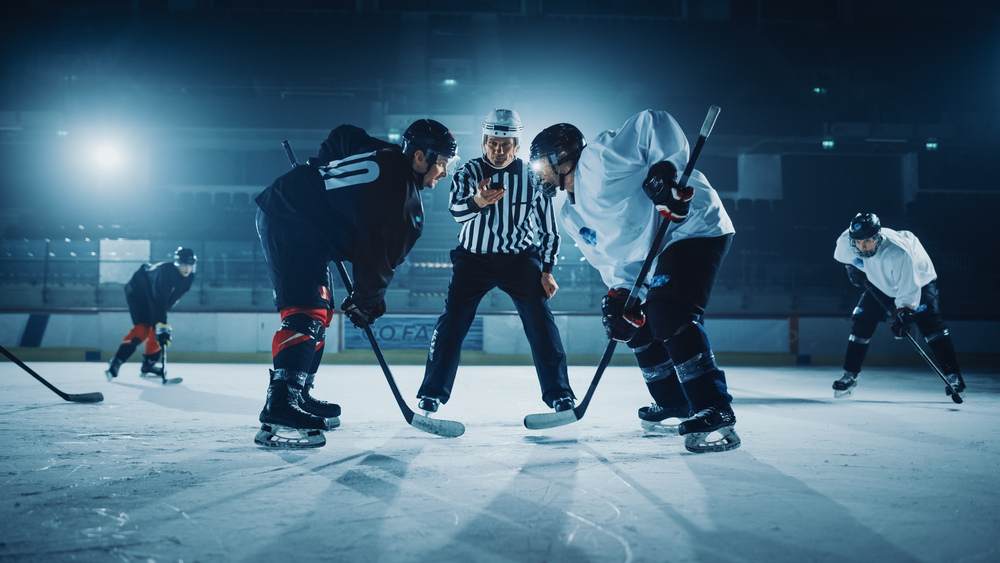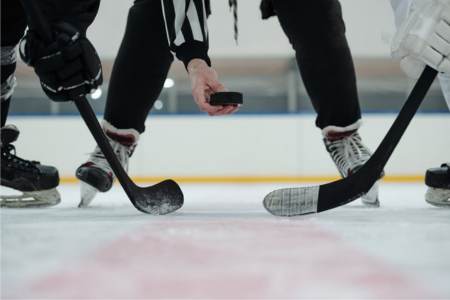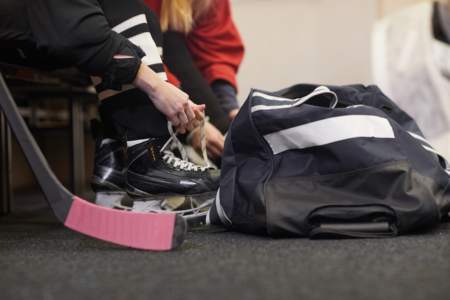
Are you passionate about hockey and eager to play a crucial role in the sport? Becoming a hockey referee is not only a unique way to engage with the game but also a responsibility that carries significant importance. In this post, we’ll guide you through the steps to embark on this exciting journey, highlighting the benefits and key actions to take.
Understanding the Role

Hockey referees are more than rule enforcers; they’re essential in maintaining the game’s integrity and fairness. With a deep knowledge of hockey’s rules and sharp observation skills, referees make quick, impartial decisions that significantly impact the game’s flow and outcome.
They also play a key role in ensuring player safety, thus upholding hockey’s competitive and fair spirit. Being a hockey referee demands expertise in the rules, quick judgment, and neutrality, making referees crucial to the sport’s integrity and enjoyment.
Now that you understand the role, let’s discuss the six steps to becoming a hockey referee.
Step 1: Gain a Solid Foundation in Hockey
Embarking on the journey of becoming a hockey referee involves more than just understanding the rules; it’s about immersing yourself in the sport in various ways. Let’s explore the multifaceted approach that will lay a strong foundation for your officiating career.
- Watch a Variety of Hockey Matches: Dedicate time to watching games across different levels. For example, the NHL features 32 teams with a variety of play styles. Analyze how referees handle different situations in these diverse settings.
- Study the Rulebook: The NHL rulebook, for instance, consists of over 200 rules, including detailed sections on penalties, types of play, and equipment standards.
- Utilize Online Resources: NHL.com, the official website, provides updates on rule changes, which can be frequent. For instance, recent years have seen changes in face-off procedures and video review processes.
- Attend Live Games: Witnessing games at local arenas, where you can observe nuances like referee positioning during power plays or how they communicate with players and coaches, provides insights that television broadcasts may not capture.
- Read Books and Listen to Podcasts: Books like “The Game” by Ken Dryden offer historical insights into hockey, while “Hockey Plays and Strategies” by Ryan Walter delves into tactical aspects. Podcasts such as “Spittin’ Chiclets” offer current discussions on the NHL and insights into the sport.
- Play the Game: Participating in local leagues provides a practical understanding of the rules. For instance, experiencing a power play or penalty kill firsthand can deepen your understanding of these crucial game moments.
- Follow Professional Referees: Study the careers of referees like Wes McCauley, known for his clear communication and control of the game, or Kelly Sutherland, who has officiated numerous Stanley Cup Finals, to understand the different paths and skills required in the profession.
In your quest to learn how to become a hockey referee, remember that each of these steps is integral to building a well-rounded understanding of the game. From studying rules to experiencing the game firsthand, every aspect contributes to your growth as a referee.
Step 2: Complete a Refereeing Course
Most hockey associations require prospective referees to complete a certification course. These courses cover rules, officiating mechanics, and on-ice positioning. Here are some of the courses that you should consider:
- USA Hockey Officiating Program: This
program is a primary avenue for referee certification in the United States. It offers several levels of
certification:- Level 1: Designed for beginners, covering basic rules and on-ice positioning. Ideal for officiating youth and recreational leagues.
- Level 2-4: These advanced levels delve deeper into the rules, game management, and complex scenarios. They are suitable for officiating higher levels of competition, including junior and adult leagues.
- Hockey Canada Officiating Program: This is the standard for referees in Canada. It includes:
- Level I to III: These levels focus on the basic rules, positioning, and procedures suitable for
officiating minor and recreational hockey. - Level IV to VI: Aimed at those who want to referee high-level games, including junior, senior, and semi-professional hockey.
- Level I to III: These levels focus on the basic rules, positioning, and procedures suitable for
- International Ice Hockey Federation (IIHF) License: For those aiming to officiate at the international level, obtaining an IIHF license is
essential. It requires:- Participation in IIHF Officiating Camps: These camps are selective and focus on advanced rule interpretations, physical conditioning, and mental training.
- Demonstration of Proficiency: Referees must show high proficiency in officiating to be considered for international matches.
Look for programs offered by your local or national hockey association. Completing such a course is not just a requirement; it’s an opportunity to learn from experienced referees and connect with others who share your passion.
Step 3: Acquire the Right Gear

When learning how to become a hockey referee, the right gear is crucial for safety, mobility, and professionalism. Start with a high-quality, official referee jersey, typically black and white striped, with orange bands on the arms for leagues like the NHL. Your safety gear should include:
- A specially designed helmet with a visor or cage.
- Lightweight yet protective shin guards.
- Elbow pads.
- A protective cup.
Referee pants, distinct from player pants, should be black, comfortable, and allow for easy movement. Like the popular Fox 40, a high-quality whistle is essential for game control, with many referees preferring models with finger grips.
Invest in quality skates explicitly designed for referees, featuring a lower cut for better ankle flexibility. A durable referee bag is necessary to transport and organize your gear, including skates, helmets, and uniforms. Always carry the latest hockey officiating rulebook for your league and a notebook or game cards for recording game details.
Don’t forget miscellaneous items like a water bottle, skate sharpening tools, laces, and a sewing kit for emergency repairs. Each piece of equipment is vital to your performance and safety as a hockey referee.
Step 4: Start Officiating at Lower Levels
Begin your officiating journey at lower-level games. Doing so will allow you to hone your skills, build confidence, and understand the nuances of managing players and coaches. Each game is a learning opportunity, so take feedback seriously and continuously improve.
- Identify Local Leagues and Tournaments: Start by finding opportunities in local youth leagues, high school games, or recreational adult leagues. For example, in the United States, you can reach out to organizations like USA Hockey or local high school athletic associations, which often need referees for their games.
- Register with Local Hockey Associations: Many regions have local hockey associations that manage officiating assignments. Registering with these organizations can provide a steady flow of officiating opportunities at lower levels.
- Attend Officiating Clinics: Participate in officiating clinics offered by these associations. These clinics provide practical experience and help you understand the rules and regulations of the league you officiate in.
- Start with Youth Games: Youth hockey games are an excellent starting point. They offer a less intense environment where you can focus on learning the basics of game management, positioning, and decision-making.
- Work as a Linesman: Before taking on the full responsibilities of a referee, consider starting as a linesman. This role will help you understand the dynamics of the game from an official’s perspective without the pressure of being the primary decision-maker.
- Gradually Increase Complexity: As you gain confidence and experience, gradually move up to officiating more complex and faster-paced games, such as higher-level youth tournaments or adult leagues.
The path to becoming a hockey referee is a journey filled with learning and growth. Starting at the local level and gradually moving up allows you to build a strong foundation in officiating. Remember, every game you officiate is a step forward in your officiating career.
Step 5: Stay Fit and Sharp
A critical aspect of learning how to become a hockey referee is maintaining your physical and mental fitness. Let’s delve into a comprehensive approach to staying fit, sharp, and informed, which is essential for every aspiring hockey referee.
- Develop a Fitness Routine: Create a regular workout regimen focused on agility, endurance, and strength. Exercises like running, interval training, and plyometrics are particularly beneficial for referees to maintain the stamina required to keep up with the game’s pace.
- Incorporate On-Ice Training: In addition to gym workouts, include on-ice skating drills in your routine. Practice quick starts, stops, and turns to mimic game situations, which helps in improving your on-ice positioning and movement.
- Mental Agility Exercises: Mental fitness is as crucial as physical fitness. Engage in activities that enhance decision-making skills and concentration, such as playing chess, solving puzzles, or practicing mindfulness techniques.
- Regular Rule Study: Allocate time each week to review and study the hockey rulebook. Stay informed about any rule changes or updates. Subscribing to official hockey newsletters or attending officiating webinars can be helpful.
- Participate in Officiating Forums and Discussions: ngage in online forums or local officiating meetings where you can discuss scenarios and interpretations with fellow referees, keeping you mentally sharp and broadening your understanding of the game.
- Nutrition and Rest: Follow a balanced diet that supports your physical activity level. Ensure you get adequate rest and recovery, as fatigue can impact both your physical performance and decision-making abilities on the ice.
- Continuing Education: Attend annual officiating clinics or workshops. These not only serve as a refresher for your skills but also provide insights into the latest trends and techniques in hockey officiating.
- Feedback and Self-Assessment:Continuously seek feedback from peers, mentors, or coaches, and be open to self-assessment, which will help you identify areas for improvement and keep your officiating skills sharp.
- Professional Development Opportunities: Look out for advanced officiating courses or seminars conducted by experienced professionals in the field. These can offer deeper insights into the finer aspects of hockey refereeing.
Staying fit and sharp is crucial for a hockey referee. It involves a balanced mix of physical training, mental agility exercises, and continuous learning. By maintaining a disciplined approach to fitness and education, you ensure that you are always at the top of your game, both physically and mentally.
Step 6: Advance Through the Ranks
Advancing through the ranks as a hockey referee involves:
- A strategic approach to career development.
- Focusing on gaining experience.
- Enhancing skills.
- Networking within the hockey community.
Here’s how you can systematically move up in your officiating career:
- Gain Diverse Officiating Experience: Actively seek opportunities to officiate a variety of games at different levels. Each level, from youth to adult leagues, offers unique challenges and learning experiences.
- Seek Higher-Level Certifications: As you gain experience, aim for higher levels of certification offered by organizations like USA Hockey or Hockey Canada. For example, reaching Level 4 in USA Hockey’s Officiating Program can open doors to officiating at national tournaments and higher leagues.
- Participate in Elite Officiating Camps: Attend elite development camps, often hosted by national hockey organizations. For example, the USA Hockey Officiating Development Program (ODP) offers camps that are pathways to officiating in collegiate, junior, and professional hockey.
- Build a Strong Professional Network: Connect with other referees, linesmen, and hockey officials at games and events. Attend officiating conferences and workshops to meet peers and learn from experienced professionals in the field.
- Record and Review Your Games: If possible, record the games you officiate and review them to analyze your performance. Focus on your positioning, call accuracy, and game management skills.
- Apply for Higher-Level Opportunities: Keep an eye on openings for officiating positions in higher leagues or tournaments. When you feel ready, apply for these positions, leveraging your experience, certifications, and network.
As you learn how to become a hockey referee, remember that each step you take towards gaining experience, acquiring higher certifications, and building professional relationships is instrumental in elevating your officiating career.
How Much Does a Hockey Ref Make?

How much a hockey ref earns can vary significantly based on the level at which they officiate. Let’s break down the typical earnings of a hockey referee from local leagues up to the NHL.
Local and Youth Leagues
- Entry-Level Refereeing:
- Pay Range: $20 – $50 per game.
- Factors Influencing Pay: Geographic location, league budget, and game length.
- Frequency of Games: Usually on weekends, potentially allowing for multiple games per day.
High School and Junior Leagues
- Intermediate Level:
- Pay Range: $50 – $100 per game.
- Additional Factors: Level of competition and local or regional tournament games may offer higher pay.
- Game Frequency: Regular season games during weekdays, with tournaments on weekends.
College and Semi-Professional Hockey
- Advanced Officiating:
- Pay Range: $100 – $300 per game.
- Considerations: Higher skill levels and game intensity. College games often require more experienced
referees. - Opportunities: Includes both regular season and playoff games, with potential bonuses for playoff
games.
Professional Minor Leagues (e.g., AHL, ECHL)
- Professional Level:
- Pay Range: $200 – $400 per game.
- Contractual Work: Many refs at this level work under contract, which may include additional benefits.
- Game Schedule:A more consistent game schedule, with opportunities for more regular work.
National Hockey League (NHL)
- Elite Officiating:
- Salary Range: NHL referees can earn from $165,000
to $360,000 per year. - Per Game Earnings: On average, $1,500 – $3,000 per game.
- Additional Info: Full-time NHL referees receive benefits and bonuses while also having a more
consistent game schedule. Playoff games and special events like the Stanley Cup can lead to additional bonuses.
- Salary Range: NHL referees can earn from $165,000
Where to Find a Job in Hockey
Now that you know how to become a hockey referee, it’s time to take your next steps in this exciting and rewarding career. For more resources and job opportunities in this field, consider exploring the offerings at Jobs in Sports.
Our platform provides access to a wide array of sports job listings and is an excellent resource for both beginners and seasoned professionals. Whether you’re seeking further education or looking for your next officiating opportunity, our free and paid memberships provide special job-searching features, such as posting your resume, to help guide your journey.
Join the Jobs in Sports community today to connect with opportunities and make your mark in the world of hockey officiating.





